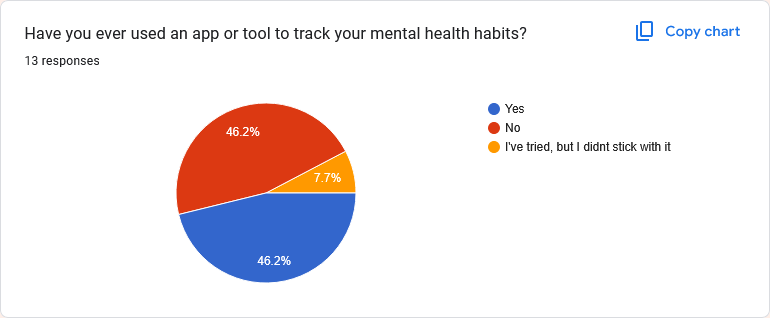🧠Mental Health Habit Tracking - A UX Research Case Study
Case Study
An exploratory research study on journaling, mood tracking and meditation apps.
Role: UX Researcher
Timeline: 2 weeks
Tools: Google Forms, Interviews, Thematic Analysis
📝Overview
This self-initiated UX research project explores how individuals track their mental health habits — such as journaling, mood tracking, and meditation — using mobile apps. The goal was to uncover user behaviors, emotional drivers, and pain points to inform better app experiences and promote long-term engagement.
🎯Research Goals
Understand how users track mental health habits
Identify their motivations and barriers
Uncover behavioral patterns and emotional drivers
Generate UX recommendations for habit tracking tools
🛠️Methods
Survey: 13 Participants via Google Forms
Interviews: 3-5 participants, semi-structured format
🔍Key Insights
Time and energy are the biggest barriers
Users frequently stop using apps due to time constraints or mental fatigue.
“The time it takes to continually upload.”
“I always think I’m too busy.”
Sleep is the most consistently tracked habit
Sleep tracking appeared in over2/3 of responses, often via automated apps like SleepWatch.
Consistency comes from automation or emotional reflection
Users who stayed consistent either automated tracking or tied it to personal motivation.
“Just reminding myself why i started in the first place!”
Tracking motivations are deeply personal
Reasons ranged from curiosity and self-care to sobriety and medical needs.
“Trying to help myself feel better… to be selfish for once.”
“Maintaining positive mental health in sobriety.”
✅Design Recommendations
Build for Time-starved users: simplify input, batch entry, or passive tracking
Leverage automation: auto-track habits like sleep and mindfulness sessions
Connect to personal motivation: prompt reflection or celebrate small wins
Support flexible routines: no rigid streaks, allow messy engagement
💭Reflection
This project helped me better understand the emotional and behavioral nuances behind habit tracking. It taught me that even simple tools can fail if they don't respect the user's mental load, and that motivation alone isn't enough without thoughtful UX support.
🔮Next Steps
I’d like to expand this by testing small design changes that integrate automation and explore reflection prompts for increased habit longevity.
📬Call to Action
Want to discuss this project or see the full research data?
Let’s talk! yani2x4@gmail.com



